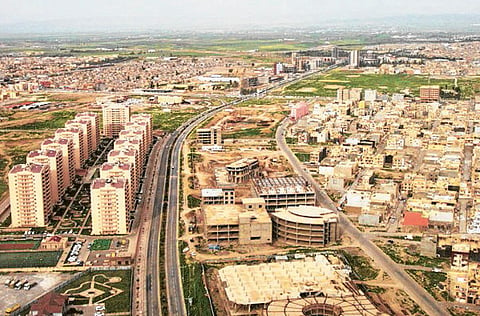Regional airlines plan Sulaimaniyah services
Flydubai and Gulf Air will fly to Iraqi-Kurdish city

Dubai: Dubai's low cost airline flydubai and Bahrain's national carrier Gulf Air are among regional airlines that will start services to the second largest city in northern Iraq's Kurdistan region, Sulaimaniyah, in the next few weeks.
Flydubai will begin flying to Sulaimaniyah on November 25. This will be the airline's second destination in Iraq. It already flies to Arbil.
"The service to Sulaimaniyah underlines flydubai's commitment and confidence in Iraq, which has attracted a lot of investment from the UAE, helping to increase trade links and cement ties between the two nations," said Gaith Al Gaith.
Flying twice a week, flydubai's flight FZ205 will depart from Dubai at 10.15pm and arrive at 12.25am local time. Flight FZ206 from Sulaimaniyah to Dubai will leave at 1.10am and arrive at Dubai International Airport Terminal 2 at 4.40am local time.
Meanwhile, Bahrain's national carrier Gulf Air, which already flies to four Iraqi destinations, is also planning to add Sulaimaniyah to its network.
Expansion
In March, Gulf Air's CEO, amer Al Majali, revealed that it planned to start services to the city by the end of 2010 or early 2011.
In an exclusive interview with the Kurdish Globe he said: "Iraq is an important market for Gulf Air and that is why we will add more destinations in the country in the near future".
On December 1, Nile Air, an Egyptian airline, will make its maiden flight from Cairo to Sulaimaniyah and Baghdad.
Among the airlines that fly to Sulaimaniyah International Airport, which opened in 2005, are Iraqi Airways, Royal Jordanian, Germany's Air Berlin and a few other charter companies. The city is connected to numerous destinations throughout Europe and the Middle East, including Amsterdam, Istanbul, Beirut, Munich, Athens and Dubai.
Sulaimaniyah, also called ‘Sulaimani' by the majority of the Kurdish population, is a growing metropolis of more than a million residents.
The secular, Kurdish cultural centre is often called the ‘Paris of Iraq' because of its sophisticated lifestyle, its picturesque tree-lined boulevards and the liberal attitude of the city's inhabitants.
Iraq's largest telecommunication company, AsiaCell, is based in Sulaimaniyah. The city is also home to the sprawling American University of Iraq in Sulaimani (AUI-S). The Grand Millennium Sulaimaniyah, modelled on Dubai's Burj Al Arab hotel and managed by a UAE-based division of the global hotelier, will open in 2011.
The area around Sulaimaniyah is a draw for many Iraqi and regional tourists who are attracted by the region's Mediterranean climate, the lush green mountain scenery and the city's shopping malls and nightlife.
Six airports
Currently, Iraq has six international airports: Baghdad, Basrah, Mosul, Najaf, Arbil and now Sulaimaniyah. Arbil and Sulaimaniyah are in the Kurdistan region.
The country is currently building other international airports in Karbala, Tikrit, in Salahaddin Province, Nassiriyah and Missan; there are also plans for other airports in Kirkuk and Anbar Province.
However, Arbil has become the favourite for international carriers. Situated in the centre of the Kurdistan region, it has attracted more than $16 billion of foreign investment in the past few years.
With tourism flourishing in the area and millions of Kurdish expatriates residing around the world, the Kurdistan region has become an attractive market for many global airlines.
Arbil International Airport opened in 2005. In March this year, the soft opening of a new, state-of-the-art international terminal took place at the airport. It also opened the world's fourth longest runway, 4,800 metres.
The $600 million Arbil airport is used by many global and regional airlines including Lufthansa, Austrian Airlines, Etihad Airways, Gulf Air and flydubai.
The airport claims to offer the least expensive fuel for aircraft in the Middle East, and probably in the world, at less than 50 US cents per litre.
Mariwan F. Salihi is an Iraqi journalist working for the Arbil-based Kurdish Globe.



